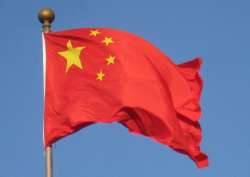China plans to build nuclear aircraft carrier
China commissioned its first-ever aircraft carrier, Liaoning, a refurbished Soviet ship it bought from Ukraine, in 2012. Its second carrier and the first domestically built carrier, known as Type 001A, was launched in April last year.

China plans to build its first nuclear-powered aircraft carrier and submarines as part of the PLA Navy's transformation as a major blue-water force, the state-owned defence company said, amid growing Chinese assertiveness in the strategic Indo-Pacific region.
China commissioned its first-ever aircraft carrier, Liaoning, a refurbished Soviet ship it bought from Ukraine, in 2012. Its second carrier and the first domestically built carrier, known as Type 001A, was launched in April last year.
A third aircraft carrier, Type 002, is said to be under construction at the Shanghai Jiangnan Shipyard Group, although it has yet to be officially confirmed by authorities.
China Shipbuilding Industry Corporation (CSIC) said in a statement on Tuesday that it plans to "speed up the process of making technological breakthroughs in nuclear-powered aircraft carriers, new-type nuclear submarines, quiet submarines, maritime unmanned intelligent confrontation systems, maritime three-dimensional offensive and defensive systems, and naval warfare comprehensive electronic information systems."
This is the first time a state-owned Chinese defense firm has openly identified nuclear-powered aircraft carriers on its agenda, said the Global Times, the tabloid affiliated to the People's Daily - the mouthpiece of the ruling Communist Party of China.
Hong Kong's South China Morning Post also reported that the first nuclear-powered aircraft carrier could be operationalised by 2025 to bolster its maritime defence capabilities.
Military experts said China may have achieved initial progress in its research of nuclear-powered aircraft carriers and that it may not be too long before the authority confirms the news, the Global Times report said.
"I think we can say that China has made major breakthroughs in the implementation of nuclear power on large vessels," Li Jie, a Beijing-based naval expert was quoted as saying.
Hu Wenming, chairman of the board of CSIC, had said last year that China is capable of designing and building any type of aircraft carrier.
"Hu's speech indicates that China can build aircraft carriers powered by either diesel, gas or nuclear power. The country has mastered all the fundamental core technologies, including ski-jump and catapult-assisted launch technologies," Li said.
"In the future, China's national interests will continue to expand overseas. Without a fleet of large nuclear-powered vessels, the Chinese navy cannot sail for a long time to faraway waters," Li said.
Aircraft carriers with conventional power require the company of large depot ships, Li said, which in turn requires replenishment from ports or overseas bases.
"This is conducive to protecting national security and overseas interests."
Established in July 1999, CSIC owns the largest shipbuilding and repair facilities in China and is a leading player in the research and design of naval and merchant ships.
The US military is periodically sending warships and air force jets to assert freedom of flights and navigation over the strategic South China Sea as China claims most of it. Vietnam, the Philippines, Malaysia, Brunei and Taiwan have counter claims over the area.
China also has maritime territorial dispute with Japan in the East China Sea.